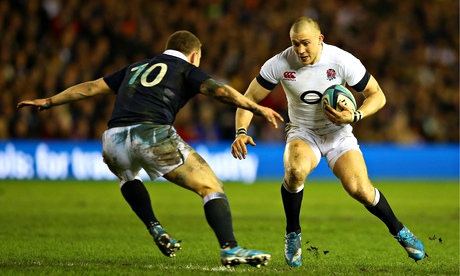
1 Run with the ball: England frolic to victory
The pitch may have been sodden and infected by parasites but the expected war of attrition turned into a frolic for England. Two years ago they had kicked their way to victory at Murrayfield but this time they ran. They dominated not only the set pieces but the breakdown, getting the ball away quickly for Danny Care to launch his back division. Mike Brown carried the ball for more metres than all of Scotland's backs, replacements included, combined and Jonny May on the wing received the ball almost as many times as the Scotland outside-half, Duncan Weir. Two tries may have been meagre reward for England's possession and ambition and they again failed to score in the final quarter but their attacking game has advanced significantly since 2012.
2 Burrell pace makes up for Tuilagi absence
Tuilagi's absence was marked in the autumn when England laboured behind the pack but the emergence of Luther Burrell as a 13 will give Stuart Lancaster cause to ponder when the Leicester centre is fit again. Burrell has been playing at inside-centre for Northampton, a breaker of the gain-line, but in his two games for England he has shown pace and awareness. If he had to support and run hard for his try in France, on Saturday he noticed that the defence was drifting across and took an inside line, avoiding contact. With Care getting the ball away quickly and the understanding between Owen Farrell and Billy Twelvetrees developing, England are playing with width. Burrell may not have the dynamism of Tuilagi but he has an appreciation of everything around him and has not looked an international novice.
3 Lancaster stuck to his guns successfully
Lancaster was criticised for the replacements he made against France when he took off key players with a quarter of the match remaining and France within a converted try of regaining the lead. He did not make a change until the 63rd minute on Saturday and that was enforced when Joe Launchbury suffered a dead leg. Care and the hooker Dylan Hartley remained on until the final 10 minutes, the latter's 100% record in the lineout ending when Tom Youngs replaced him. In his two years in charge, Lancaster (above right with the coach Mike Catt and the Calcutta Cup) has tended to make changes at 2 and 9 from 53 to 60 minutes and the way he manages his bench could be decisive against an Ireland team that has displayed staying power in its first two rounds.
4 Will England tactics withstand Irish scrutiny?
England need to defeat Ireland to remain in contention for the title and, while they have lost at Twickenham only once in the last three Six Nations campaigns, they will face a side that is appreciably stronger and better equipped than Scotland. Ireland sabotaged Wales' lineout on Saturday and got the edge up front but it was in the loose where they dominated. Peter O'Mahony was a mixture of Dan Lydiate and Sam Warburton, felling ball-carriers, getting on his feet and scavenging for the ball, while Jonathan Sexton kept his pack going forward with accurate line-kicking. There may have been nothing flash about the men in green but England will need to be spot-on tactically on a day when their relative lack of experience behind will be scrutinised.
5 Spiritless Scotland left in a sorry state
Scotland were abject in conditions that should have suited the underdog but they had no hunger or bite. The No8 David Denton was an exception, but when he was hooked on 52 minutes, his look of disgust as he left the field saying it all, any resistance went with him. The decision to drop the captain, Kelly Brown, and the Lions second-row Richie Gray from the 23 was bizarre, given the home side's overall lack of quality. There was no cohesion or sense of collective spirit and a repeat will signal defeat in Rome in the next round. Other than some scrambling in defence and Denton's defiance, there was nothing for them to salvage from the wreckage. They were as dismal as the weather and as soft as the shocking playing surface. It is hard not to be saddened by the state they are in.

